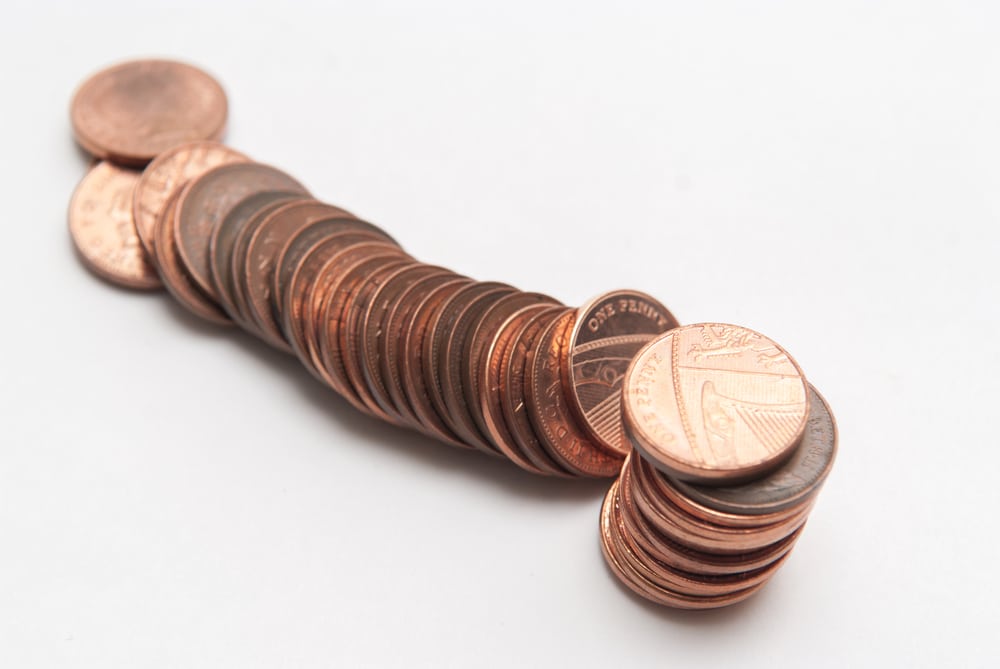Jasmine Birtles
Your money-making expert. Financial journalist, TV and radio personality.


Do you need some fun ways to save money?
January can be a tough month. Not only does it somehow feel ten times longer than every other month, but early pay packets at Christmas time mean we have to stretch our income much further.
The January blues also set in, and having no money can top it all off. Don’t fear! We are here to ensure you know all the tips and tricks out there to save some serious cash. Whether you want to save for that dream holiday, pay off some debt or get a few more quid in the house deposit fund, we have loads of ways to help you stash some extra money away.
So, here are 14 fun ways to save money this month and throughout the year.

The 1p challenge is a great place to start on your savings journey. Perhaps one of the most well-known savings challenges, this lasts 365 days and is one of our favourite fun ways to save. You don’t have to start this at the beginning of the year, either. There is always a good time to begin!
Essentially, you start with 1p, and increase the amount you save by 1p every day. So, on day one, you save 1p, day two you save 2p, day three 3p, and so on. On day 365, you’ll save £3.65. Once you put all the savings together from the whole year, you will have saved a tidy £667.95. Not too shabby.
It may seem manageable, but it can absolutely get tough towards the end. It is a good idea to keep track of your savings to keep you motivated. For example, you could cross off every day on a calendar. Or, you could keep note in a budgeting diary. A normal notebook works too.
If you think you may struggle, you could put away all savings for the following month in one go. Remember, the easiest time to save money is on pay day!
You could put physical money into a jar and watch the pot grow, or you could put it in an online savings account. Work out what works well for you. Everyone is different when it comes to saving money.
The 50-envelope savings challenge – sometimes the 52-envelope savings challenge, is another great, straight forward way to save some cash. If you are ready for a new savings challenge and want to push yourself, this could be for you.
With the 50-envelope savings challenge, you could save up to £1275 in 50 weeks. You could put this money towards a house deposit, a holiday or your even use some of it on Christmas presents – the opportunities are endless. With inflation rising and food costs and energy bills soaring, you may even want to save to allow yourself a financial buffer.
This challenge includes labelling 50 envelopes with the number one to 50. You then fill the envelop with the corresponding amount of money every week. For example, on week one, you put £1 in the envelope. On week two, you put £2 in the envelope.
You can either do this in order, or pick random envelopes every week. You may choose to get some of the larger numbers out of the way first. If you have some spare cash, you may choose week 50 first, putting £50 into the envelope.
We wrote a whole article about this savings challenge – you can read this here.

When thinking about your savings, it is always a good idea to think about what your money is going towards. You could be saving for your retirement or a first-time house deposit. Whatever you have in mind, a Lifetime ISA may be a good place to start.
You can put up to £4,000 into a Lifetime ISA every year. The great thing is, the government add a 25% tax-free bonus on top of whatever you save. So, if you save the full £4,000 limit, the government will give you £1,000 – totally free.
Even if you save £400 a year, the government will award you with a tax-free bonus of £100. That is totally free money – what is not to like?
It is important to be aware, however, that money from a Lifetime ISA can only be withdrawn if you are buying a house for the first time, or you are over the age of 60. If you do want to withdraw your money early, the government will take 25% of the money you withdraw.
You can read more about Lifetime ISAs here.
Do you have a bad habit you are trying to break? Perhaps you want to give up smoking, or stop swearing. A bad habit jar could be a good way to keep you on track and save money.
There are a few ways you could undertake this challenge. If you only want to save in the short term, you could put a set amount of money into a jar every time you partake in the bad habit you are trying to give up. For example, you may put £1 in a jar you swear. However, this may be seen as rewarding yourself for doing the ‘bad’ thing.
So, put money in a jar for every day you don’t do the bad habit. For every day you don’t smoke, put 50p into a jar. You could even put away the money you usually spend on cigarettes or tobacco every week. Seeing how much you could save cutting back, in physical form, could really encourage you to keep going.
If you grab a coffee on your way to work every morning, you could put the amount of money you usually spend in the jar instead, and take your own coffee. According to The Scotsman, the soaring price of milk could result in a flat white costing £4. If you get a coffee every day on your way to work, this could cost £20 per week (based on a five-day working week).
£20 per week in a jar for 52 weeks? That’s a saving of £1,040 per year. Why not give it a go?

Ah, yes, the good old-fashioned piggy-bank. It really is a tried and tested way to save. Any piggy bank will do, whether it is the shape of a pig or not! Put your spare change in there and when it’s full, open it up to see how much you have saved.
Some people put all their change away in a piggy bank. Others may put all their ‘big’ change in there, such as £1 or £2 coins. Try to get a piggy bank you can’t see into if possible – out of sight, out of mind. You’ll have less temptation to open it if you can’t see the money!
If you think you may be tempted to dip into your piggy bank before it is full, get one that you need to break open to get into. The effort to do this, as well as breaking the piggy bank for less money than you’d like, may just prevent you from getting your paws on it.
There is a reason piggy banks have stood the test of time – they really work! We love this Cute Piggy Bank on Amazon. It comes in blue and gold too!
The 50-30-20 saving method is another useful tool. This involves allocating your monthly salary into different pots. Firstly, 50% of your salary will go towards your ‘needs’. These are expenses such as your housing payments, food and bills.
30% of your salary then goes towards ‘wants’. This includes expenditure such as gifts, going out for dinner, getting a takeaway or socialising. The remaining 20% of your monthly salary should then be put into savings.
Try to put the 20% away into savings as soon as you get paid. As previously mentioned, there is no easier time to save than payday. There will be less temptation to spend it if it is in a savings account.
If you don’t think you will be able to manage putting a full 20% of your salary into savings, you can adjust these numbers. For example, you may put 60% towards your needs, 30% toward your wants and only 10% towards your savings. Do what feels best for you. There is no need to push to 20% if you are unable to manage this.

Automatically rounding up your transactions is an unbelievably easy way to save. You don’t have to think about it at all. Just spend your money as you usually do, and watch the pennies add up.
Now, this way of saving may not make you thousands of pounds a year, but every penny counts. You may be surprised at how much you save.
How does it work exactly? Say you spend £2.30 on a cup of tea when you are out browsing the shops. The amount you spend will automatically be rounded up to £3, with 70p being put into your savings.
According to Moneybox, its users make around 30 transaction per week, with the average round up at around 28p. This may not sound like a lot, but you have already saved £8.41 a week, without even thinking about it. PSA: This is almost £440 per year!
Most high street and online-only bank accounts allow you to round up your everyday spending. This is a feature you may need to switch on in your banking app. If you are unsure of how to do this, contact your bank directly. There are also many apps specifically designed to round up your spending, such as Cleo, Plum and Moneybox.
Cash stuffing is the latest savings trend sweeping across social media, in particular, video sharing platform TikTok. It is a money management technique in which you ‘stuff’ cash into envelopes that have different purposes. It can be used to tackle overspending, and help you budget and save.
You may have envelopes for housing payments, bills, food, fuel, and other necessities. Then, you could choose other envelopes you think could benefit you. Thes may include gifts, eating out, clothes, Christmas and savings. If you have any debts, you could create a debt envelope too.
Not only does this help you to budget, but it allows you to spread your money across different outgoings, and then you can see what you have left to put into savings.
Cash stuffing helps you save as you have physical money, which you can see. This helps you to visualise what you have spent and what you have left. This doesn’t need to be done with physical cash, however. Many bank accounts offer ‘cash pots’, which allow you to save for different things.
Our Magpie Isobel recently spoke with online magazine Bustle about cash stuffing. See what she had to say here.

This way to save doesn’t include actually putting money away as such. Instead, you save money by using up items you already have in your home before buying more. This could include anything, from food to cleaning products, makeup to toiletries.
According to WRAP, food waste has a value of over £19 billion per year in the UK. Of the 9.5 million tonnes of food waste produced every year, approximately 6.4 million tonnes could have been eaten. This is a staggering 15 billion meals thrown away annually.
So, why not save money and reduce waste in your home by having a ‘use it up’ month? Try to use all of the food you can from your fridge, freezer and stores before buying more. Have a clear out of your cupboards and see what you have available. You may have items you have forgotten about!
You may even impress yourself with the wide variety of meals you can make with the various tins, jars and packets hidden away.
Do a similar thing with toiletries, makeup and other personal care items. According to Avon, the average woman spends £1,365 annually on skincare, makeup and toiletries. However, most admit that around 75% of the products they purchase go partially or completely unused.
Read more about saving money and preventing food waste here.
If you don’t have the means to try and save thousands, or worry you won’t be able to manage a big goal, why not save just £1 per day? You will save £365 over the course of a year, which could be put towards your savings, or used as a financial buffer in an uncertain economy.
As with some of the previous challenges, there are a few ways you could do this. You could put a £1 coin into a pot everyday as physical money – this may motivate you to continue as you watch the pounds mound. Another option is to put money for the whole month into the pot, doing it on a month-by-month basis.
This can also be done online, using an unused bank or savings account to put your £1 contribution into. You could even set up a direct debit from one bank account to another, for £1 per day. Then, you don’t even have to think about it. In fact, you may not even notice it leaving your account!

This may seem a little out there, but it is definitely a fun way to save some cash. It is simple really – once a week, look at the temperature, and put away that amount of money.
If it is 9 degrees centigrade outside, put away £9. If it is a warm summers day of 28 degrees centigrade, pop £28 in your savings. You could do it on a set day every week, or look at the average temperature in your area for the course of the week and put that aside.
It is fun as you never quite know how much you are going to put away every week, and the money will likely build before you know it.
Putting away extra money every month and cutting back can definitely help you save; however, you may be spending money every single month without realising. Where could this money possibly be going? On bills and subscriptions.
According to Nat West, around £25 billion is wasted every single year in the UK as the result of unused subscriptions, forgotten about free trials and bad deals on your bills and other services.
Luckily for you, we have found a super handy tool to help you manage your subscriptions and save some serious cash. Little Birdie is a recently launched, free, easy to use app that helps you manage your bills, regular payments and subscriptions in one place. It also helps you become aware of goods and services you had no clue you were even paying for every month.
In fact, our Magpie Izzy is now saving over £200 per year with the help of Little Birdie. Find out more about Little Birdie here.

Increasing your pension contributions by just 1% a month is unlikely to make a huge difference to your pay packet, however it will make a mighty difference to your pension when you reach retirement.
Thanks to compound interest, even just £10 per month extra into your pension pot can build up over the years. Plus, your employer may match your contribution. This is free money with tax relief! Again, this will build up over the years. You will absolutely thank yourself for doing this.
The great thing about increasing your workplace pension is that it will be automatically deducted from your pay packet. So, the money is away and safe in your retirement fund earning interest before you have even thought about it.
Find out more about pensions here.
Could you do a no spend year? It is a big challenge, but one with lots of learning curves, great reward and if completed, a great sense of achievement.
A no spend year is exactly what it says on the tin, mostly. Although there are many essentials you need to spend money on in life – food, housing and bills for example – the no spend comes into play with non-essentials.
If you don’t know where to begin, what it involves, and what you can and can’t spend on, check out our full guide here.
